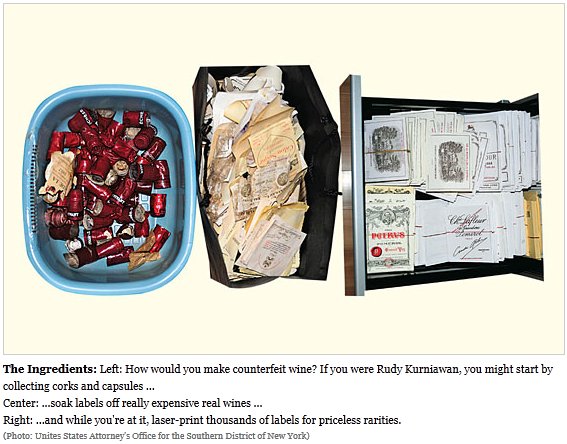A couple of years ago, I posted an item about a wine collector who got into the business of “creating” expensive old wines. BBC News talks about how this worked and how he was caught:
Rudy Kurniawan was sentenced to 10 years in jail for committing wine fraud. But just how easy is it to fake a fancy bottle of Burgundy?
Wine fraud was a problem in classical Rome and it continues to be one now. Some estimate that over 5% of wine consigned and sold at auction is fake.
But even though it is a very big problem, it is a very difficult thing to do.
“There is a distinctive taste in aged wine,” says wine chemist Andrew Waterhouse, of the University of California, Davis.
That taste?
“Canned asparagus,” he says.
Old wines — mostly those from the Burgundy and Bordeaux regions of France — have lost the majority of their tannins, giving them a softer taste reminiscent of the spring vegetable.
Bu taste is only one part of the equation. “It is the experience of drinking something that’s quite rare that’s appealing,” explains Prof Waterhouse.
A few key ingredients to the fraud: corks, capsules, and soaked-off labels from the authentic wines, plus good but not expensive wine to use either to rejuvenate the older wine or to pass off as the real thing to a less-discriminating buyer.

And that’s exactly what Mr Kurniawan was doing in his kitchen in Arcadia, California — essentially creating a “better” vintage by mixing old, good-but-not-great wines with some newer, vibrant pinot noirs.
Give it a shake, put it in an old bottle, smack on a vintage label — say, one from 1985 instead of 1982 — and voila.
“He could take a $200 bottle and turn it into over a $1,000 bottle,” says Mr Troy.
Unless you are used regularly drinking fine vintages — which at thousands of dollars a bottle, is not that many people — the taste would not raise alarm bells.
“By blending the fruitiness of a new wine with the aged character of the old wine he would approximate in some manner a very, very good aged Burgundy,” explains Prof Waterhouse.



